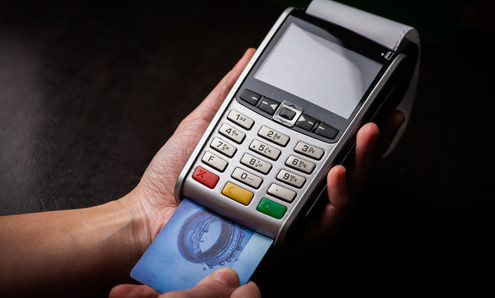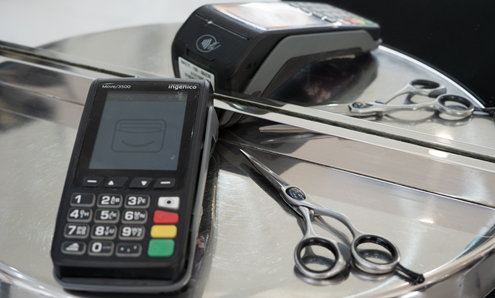What is an acquirer? A guide to merchant acquirers for small businesses
22 December 2023 | Published by Jodie Wilkinson
Did you know that over 65 million debit card transactions are made each day in the UK? Whether it’s a quick contactless tap on public transport or an online purchase from an e-commerce retailer, an acquirer plays a role in every single one of those transactions.
But what is an acquirer and how are they involved in card payments?
These financial institutions work to ensure that businesses secure their hard-earned funds in every sale they make. To understand their fundamental role in the payment ecosystem, we’re exploring exactly what acquirers are, what they do, and how they keep business payments running smoothly and efficiently.
What is an acquirer?
An acquirer is a financial institution that acts as a middleman between your business, the card networks or schemes, and the banks. When a customer enters their card details or taps to make a purchase, it’s the acquirer’s responsibility to secure authorisation from the customer’s card issuer, process their transaction, and eventually deposit the funds securely in your business account.
An acquirer is also known as a merchant acquirer or acquiring bank, so if you hear any of these terms, they all refer to the same thing: the bank or institution that processes complex card transactions. In some cases, acquirers can also offer payment processing services and provide the technology and hardware needed for businesses to accept transactions.
As acquirers handle all the sensitive information needed in a credit or debit card payment, they must be licensed by a financial regulator and card schemes. They must also follow the security standards laid out by the Payment Card Industry Data Security Standards Council to make sure businesses are handling customer details with care.
This means that businesses that work directly with an acquirer, or a payment processor who also provides acquirer services, will be able to accept card payments in line with legal regulations.
What’s the difference between an acquiring bank and an issuing bank?
There are lots of different moving parts and players in the world of payment processing, so you may have also heard of issuing banks. Let’s break down how the two differ.
We know that the acquiring or merchant bank is your direct partner in the world of card payments. When a customer purchases your business using a card, the acquiring bank completes all the steps to ensure the customer’s money is safely delivered to your business bank account.
On the other hand, the issuing bank represents your customer. They’re the bank that issues the credit or debit card to the cardholder and looks after their money. In the transaction process, an issuing bank completes various security protocols to verify that the transaction is legitimate and that the cardholder has enough money to complete it. Once they give the green light, the payment continues, and the acquiring bank takes over.
The card payment process is a back-and-forth between both parties as they work in tandem.
To give you a clearer idea of how they two work together, here’s a step-by-step of how a card payment is processed:
- A customer initiates the transaction. This could be by chip and PIN or contactless.
- The merchant’s payment provider sends the transaction request to the acquirer.
- The acquirer forwards the request onto the relevant card scheme.
- The card scheme processes the request and checks with the issuing bank to see if there’s enough money in the cardholder’s account for the payment.
- The issuer will authenticate the request and approve it if there are sufficient funds or decline it if not.
- The approved or declined request is then passed back to the card scheme, which sends it to the acquirer.
- The acquirer alerts the merchant via their payment gateway to inform them whether the transaction has been approved.
- If approved, the money is sent from the issuing bank to the acquirer, which deposits it into the merchant account.
What's the role of a payment processor?
There’s one more role in the payment process: the payment processor.
While the acquirer and issuer are firing over requests to each other on behalf of your business and your customers, the payment processor is the party that facilitates the requests. Just think: the transaction requests need a way to communicate with each other, and that’s where a payment processor comes into play. Payment processors give businesses a way to kick off a transaction request in the first place by providing the hardware and software for merchants to accept card and digital payments.
Payment processors take the request and use encryption and tokenisation to securely send the information between all the parties involved, like the acquirer, issuer, and card networks. A trusted and reputable payment processor provider, like takepayments, also helps coordinate the movement of money between accounts, keeps an eye out for any signs of fraudulent activity, and keeps a log of all transactions.
Why do businesses need a merchant acquirer?
If your business is looking to accept card payments, then you’ll need an acquirer to help you make it a smooth and seamless process. This includes transactions made:
- Using a card machine or point of sale (POS) system
- Online
- By an app
- Over the phone
- By mail order
While there are a growing number of payment methods, completing a card transaction all boils down to getting the money from your customer’s bank account delivered to your business’s merchant account. And to do that, you’ll need an acquirer.
How to choose an acquirer for your business
Selecting the right merchant acquirer is a crucial decision for your business. It's not just about processing payments; it's about finding a partner that aligns with your company’s needs and growth plans. Here are a few key things to consider:
1. What services you need
The first step is to look internally: what do you need from an acquirer? Knowing exactly what services you require can help your search as you can filter out any options that don’t fit the bill. You need an acquirer that not only processes payments but provides a suite of services tailored to your business's unique requirements.
Ask yourself:
- What types of payments do you take?
One of the most important things to consider is the type of payments you accept. Whether it’s in-person using a card machine, online via a gateway, or using a Buy Now, Pay Later provider, you need to work out which payment methods you take so you can choose an acquirer that supports them. - Which card networks do you want to partner with?
From Visa to MasterCard, the card networks you’re compatible with can ultimately affect your bottom line. Generally speaking, a broader range of card network acceptance means you’re giving more payment options to your customers. - Do you need additional services?
You might also benefit from value-added services like fraud prevention tools, tech integration, and marketing insights. These can help grow and protect your business, so they could be an important addition to look for when choosing an acquirer.
2. Your future growth plans
Your business might trade solely in the UK for now, but consider your future growth plans. If you’re hoping to expand your geographical borders and go international, you might want to learn about multi-currency processing and settlement.
Multi-currency processing and settlement is a service provided by acquirers to allow merchants to process transactions in non-domestic currencies. It also allows merchants to settle with the acquirer in a currency of their choosing.
While it may not be a priority for you now, having multi-currency options can make your transition into new markets easier in the long run.
3. Reporting
Tracking and analytics are vital for businesses to report on and manage their transactions.
A statement is a monthly invoice issued by the acquirer to the merchant detailing all transactions (volume and type) undertaken during the covered time period. The statement will also include per-transaction charges deducted by the acquirer and other costs (if applicable), such as terminal hire and chargebacks.
Each acquirer statement will differ slightly in how they report on these metrics. So, it’s worth finding out exactly what data you’ll get from your acquirer at the end of the month, as these insights can be invaluable for bettering your business.
4. Customer support
Things can go wrong; it’s inevitable. In those instances, customer service is crucial.
Look for an acquirer that offers responsive, knowledgeable, and accessible support. Whether handling a transaction query or resolving a technical issue, efficient customer service can make a significant difference, especially during critical times.
5. Fees
Finally, let's talk about fees – a crucial factor in your decision. Acquirers charge various fees, including transaction fees, monthly account fees, and potentially other service fees. Understanding these fees and how they fit into your business model is essential.
Compare fee structures of different acquirers to find the most cost-effective solution for your transaction volume and type. Remember, the cheapest option isn’t always the best – balance cost with the value of services provided.
Make life easier with payment solutions from takepayments
Here at takepayments, we know that offering methods to suit your customers and accepting payments efficiently is the cornerstone of keeping your business up and running. Whether it’s card machines, online payments, or point-of-sale systems, we can help.
Get in touch with our experts on 08082 393294 today, or visit our blog for more information about payments, the latest industry news, and more.





